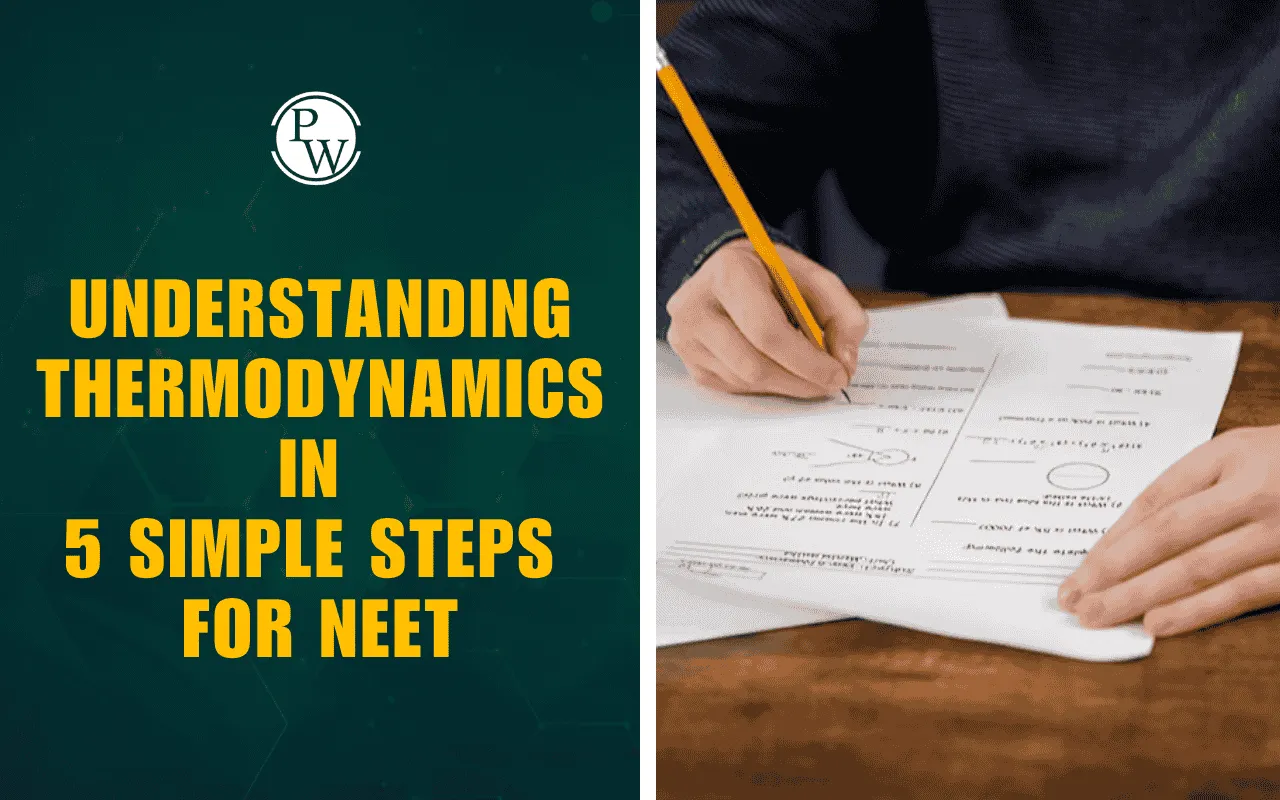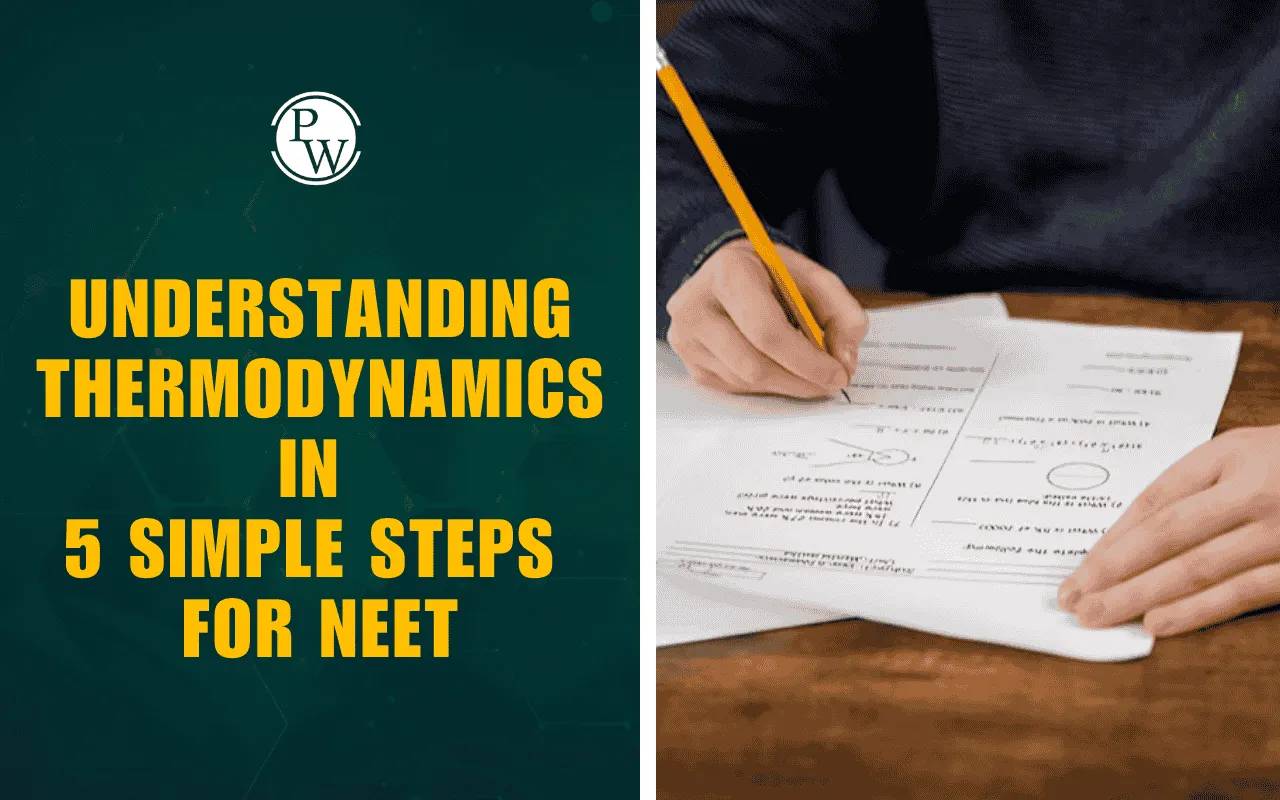

Understanding Thermodynamics in 5 Simple Steps: Thermodynamics is a very important part of Class 11 Physics and Chemistry. It helps us understand how heat moves, how energy changes from one form to another, and how work is done in physical and chemical systems. In real life, thermodynamics explains how engines run, how refrigerators cool, and how heat flows in our body and nature.
In the NEET exam, questions from thermodynamics are usually based on concepts and simple formulas. This chapter is linked to many topics in Physics like heat transfer, internal energy, and gas laws. It also supports Chemistry chapters such as Chemical Thermodynamics and Equilibrium. Because of this, thermodynamics is a must-know topic for every NEET aspirant.
Many students find this chapter difficult because it has both theory and numericals. But with the right strategy, thermodynamics can become one of the easiest and most scoring chapters in NEET. To help you study this chapter without confusion, we have explained it in five simple and clear steps.
Explore - NEET Online Courses
Understanding Thermodynamics in 5 Simple Steps Overview
Thermodynamics is a key chapter in both Physics and Chemistry for NEET aspirants. It focuses on understanding the relationship between heat, work, and energy, and plays an essential role in various other topics in both subjects. This chapter may seem complex at first, but with a structured approach, it becomes easier to grasp. Many students make the mistake of memorizing formulas without fully understanding the underlying concepts, which makes solving problems more difficult.
Download Last 5 Years NEET Previous Year Question Papers PDF
Free NEET PYQ PDF
Thermodynamics in 5 Simple Steps
Thermodynamics is the branch of physics that deals with heat, work, and energy transfer. While it can seem complex at first, breaking it down into fundamental concepts makes it much more approachable. Here's a detailed explanation of thermodynamics in five simple steps:
Step 1: Understand the Meaning of Basic Terms
The first step in mastering thermodynamics is to clearly understand the basic terms. These are the foundation of the entire chapter.
Key Concepts:
-
System: The part of the universe under study. Example: gas inside a cylinder.
-
Surroundings: Everything else outside the system.
-
Heat (Q): Energy transferred due to temperature difference.
-
Work (W): Energy used to move objects or cause expansion/compression
-
Internal Energy (U): Total energy contained within a system.
-
State Functions: Properties that depend only on the state (e.g., temperature, pressure, volume).
-
Path Functions: Properties that depend on the process or path taken (e.g., work and heat).
When these concepts are clear, it becomes easier to study the laws and apply the formulas.
Step 2: Learn the Four Laws of Thermodynamics
Understanding the laws of thermodynamics is central to this chapter. Rather than memorizing them word for word, students should focus on their physical meanings and implications.
Zeroth Law (Thermal Equilibrium)
If two systems are each in equilibrium with a third, they are in equilibrium with each other. This law introduces the concept of temperature and allows for consistent temperature measurements.
First Law (Conservation of Energy)
Energy cannot be created or destroyed, only transformed. Mathematically:
ΔU=Q−W
-
ΔU = Change in internal energy
-
Q = Heat added to the system
-
W = Work done by the system
This means any energy entering a system must either increase its internal energy or be converted into work.
Second Law (Entropy and Irreversibility)
Heat naturally flows from hot to cold objects, and no process is 100% efficient. Entropy (a measure of disorder) always increases in an isolated system, explaining why some processes (like mixing cream into coffee) are irreversible.
Third Law (Absolute Zero)
As temperature approaches absolute zero (0 Kelvin), the entropy of a perfect crystal approaches zero. This implies that reaching absolute zero is impossible.
Step 3: Memorize Key Formulas with Meaning
Once the concepts and laws are clear, students should focus on learning and practicing the formulas that are frequently used in NEET questions.
Important Formulas:
-
First Law: ΔU = Q – W
-
Work Done (Isothermal): W = nRT ln(V₂/V₁)
-
Work Done (Constant Pressure): W = PΔV
-
Heat Capacity: Q = nCΔT
-
Relationship Between Cp and Cv: Cp – Cv = R
-
Efficiency of Heat Engine: η = (W/Q₁) × 100
-
Internal Energy of Ideal Gas: U = (f/2)nRT
-
For monoatomic gas: f = 3
-
For diatomic gas: f = 5 (at room temperature)
Students should not just memorize these formulas but also understand how they are derived and where they are used. Practice helps in remembering and applying them correctly.
Step 4: Practice Numericals
Thermodynamics has a mix of theory and numericals. NEET often asks questions that test both.
-
To build your confidence.
-
Start with NCERT solved examples.
-
Move to NEET previous year questions from this chapter.
-
Focus on questions with calculation-based reasoning.
-
Practice solving problems involving isothermal and adiabatic processes.
-
Time yourself when solving, as NEET is a time-bound exam.
Solving 5–10 questions daily, especially numerical ones, will strengthen your grip on this chapter. Always check your mistakes and try to understand the concept behind the correct answer.
Step 5: Thermodynamics in Daily Life
These principles power our modern world:
-
Power Generation: Every heat engine, from steam turbines to car engines, operates within the limits set by thermodynamics. The Carnot efficiency (η = 1 - Tc/Th) gives the maximum possible efficiency for any heat engine.
-
Refrigeration and Climate Control: Your refrigerator and air conditioner work by forcing heat to flow "uphill" from cold to hot, using external work - a direct application of thermodynamic principles.
-
Chemical and Biological Systems: From industrial chemical reactions to the energy cycles in living cells, thermodynamics explains what's possible and what's not in nature's transformations.
Prepare for NEET with PW Online NEET Coaching! Our courses offer structured lessons, clear explanations of concepts, and interactive classes to support your NEET preparation effectively.
|
Explore Important Links Physics Topic Wise NEET Notes for Class 11 |
|
Understanding Thermodynamics in 5 Simple Steps FAQs
Is Thermodynamics hard for NEET?
What is the main goal of thermodynamics?
How do the laws of thermodynamics apply to real life?
What is entropy in simple terms?
What is absolute zero?













